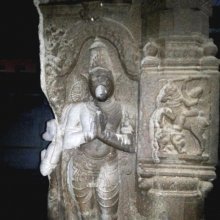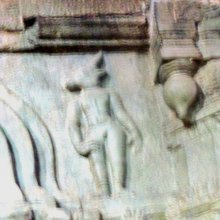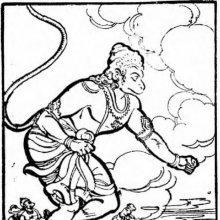Jambavat, Jāmbavat, Jāmbavān, Jambavan: 9 definitions
Introduction:
Jambavat means something in Hinduism, Sanskrit, Jainism, Prakrit. If you want to know the exact meaning, history, etymology or English translation of this term then check out the descriptions on this page. Add your comment or reference to a book if you want to contribute to this summary article.
Images (photo gallery)
In Hinduism
Purana and Itihasa (epic history)
Source: archive.org: Puranic EncyclopediaJāmbavān (जाम्बवान्).—A monkey of extraordinary might. He was the minister of Sugrīva.* Birth. When the troubles and hardships caused by the wickedness of Rāvaṇa became unbearable the goddess Earth and the Devas approached Brahmā for redress. Brahmā took them to the sea of Milk. Mahāvisṇu heard everything and said that he would incarnate as the son of Daśaratha and would kill Rāvaṇa. Brahmā was directed to create monkeys to help him on that occasion. Accordingly Brahmā created Jāmbavān and several other monkeys. There are two stories about the birth of Jāmbavān in the Purāṇas. (See full article at Story of Jāmbavān from the Puranic encyclopaedia by Vettam Mani)
Source: Cologne Digital Sanskrit Dictionaries: The Purana IndexJāmbavān (जाम्बवान्).—(Ṛkṣa)—the son of Rakṣā and Prajāpati (also Jāmbavat)—The Lord of Ṛkṣas who celebrated Vāmana's victory over Bali.1 The same person is said to have been an ally of Rāma.2 Killed the lion that killed Prasena (s.v.) and took the syamantaka (s.v.) to his child. Kṛṣṇa and his citizens traced the footsteps of Prasena, which led them to the cave of Jāmbavān. Kṛṣṇa fought with the latter for twenty-eight days Jāmbavān acknowledged his defeat and praised Hari. He bestowed his daughter Jāmbavatī and the jewel on Kṛṣṇa.3 Attained salvation by satsaṅga;4 present at Rāma's abhiṣeka.5
- 1) Bhāgavata-purāṇa VIII. 21. 8; Brahmāṇḍa-purāṇa III. 7. 300-4; Viṣṇu-purāṇa IV. 13. 32-58.
- 2) Bhāgavata-purāṇa IX. 10. 19 and 44.
- 3) Bhāgavata-purāṇa X. 56. 14-32; Brahmāṇḍa-purāṇa III. 71. 35; Matsya-purāṇa 45. 7-8, 12-6; Vāyu-purāṇa 96. 34.
- 4) Bhāgavata-purāṇa XI. 12. 6.
- 5) Viṣṇu-purāṇa IV. 4. 100.

The Purana (पुराण, purāṇas) refers to Sanskrit literature preserving ancient India’s vast cultural history, including historical legends, religious ceremonies, various arts and sciences. The eighteen mahapuranas total over 400,000 shlokas (metrical couplets) and date to at least several centuries BCE.
Vaishnavism (Vaishava dharma)
Source: Pure Bhakti: Brhad BhagavatamrtamJāmbavān (जाम्बवान्) refers to:—The chief of monkeys, also known as the chief of bears. He fought for Śrī Rāmacandra in the battle against the demon Rāvana. He fought against Śrī Kṛṣṇa for the Syamantaka jewel, and upon his defeat, presented the Lord with his daughter, the beautiful Jāmbavatī. (cf. Glossary page from Śrī Bṛhad-bhāgavatāmṛta).

Vaishnava (वैष्णव, vaiṣṇava) or vaishnavism (vaiṣṇavism) represents a tradition of Hinduism worshipping Vishnu as the supreme Lord. Similar to the Shaktism and Shaivism traditions, Vaishnavism also developed as an individual movement, famous for its exposition of the dashavatara (‘ten avatars of Vishnu’).
General definition (in Hinduism)
Source: WikiPedia: HinduismJāmbavān (जाम्बवान): Jambavan or Jamvanta is a bear in Hinduism and believe to lived from Treta Yuga to Dvapara Yuga.
In Jainism
General definition (in Jainism)
Source: archive.org: Een Kritische Studie Van Svayambhūdeva’s PaümacariuJāmbavān (जाम्बवान्) participated in the war between Rāma and Rāvaṇa, on the side of the latter, as mentioned in Svayambhūdeva’s Paumacariu (Padmacarita, Paumacariya or Rāmāyaṇapurāṇa) chapter 57ff. Svayambhū or Svayambhūdeva (8th or 9th century) was a Jain householder who probably lived in Karnataka. His work recounts the popular Rāma story as known from the older work Rāmāyaṇa (written by Vālmīki). Various chapters [mentioning Jāmbavān] are dedicated to the humongous battle whose armies (known as akṣauhiṇīs) consisted of millions of soldiers, horses and elephants, etc.
Source: archive.org: TrisastisalakapurusacaritraJāmbavat (जाम्बवत्) is the name of a Kapi or Monkey-chief, according to the Jain Ramayana and chapter 7.6 [Bringing news of Sītā] of Hemacandra’s 11th century Triṣaṣṭiśalākāpuruṣacaritra: an ancient Sanskrit epic poem narrating the history and legends of sixty-three illustrious persons in Jainism.—Accordingly, as Hanumat said to Rāma: “There are many Kapis like me. King Sugrīva says this from affection. [e.g., Jāmbavat, ...], and many other Kapi-chiefs are here, master. Completing their number, I am ready to do your work. Shall I lift up Laṅkā with Rākṣasadvīpa and bring it here? Or shall I capture Daśakandhara and his relatives and bring them here? [...]”.

Jainism is an Indian religion of Dharma whose doctrine revolves around harmlessness (ahimsa) towards every living being. The two major branches (Digambara and Svetambara) of Jainism stimulate self-control (or, shramana, ‘self-reliance’) and spiritual development through a path of peace for the soul to progess to the ultimate goal.
Languages of India and abroad
Sanskrit dictionary
Source: DDSA: The practical Sanskrit-English dictionaryJāmbavat (जाम्बवत्).—m. Name of a king of bears who was of signal service to Rāma at the siege of Laṅkā. He was also noted for his medical skill. [This same Jāmbavat appears to have lived up to the time of Kṛsna, or perhaps he was another being of that time; for there was a fight between Kṛṣṇa and Jāmbavat for the Syamantaka jewel which the latter had got from Prasena, brother of Satrājit. Kṛṣṇa vanquished Jāmbavat, who placed the jewel, along with his daughter Jāmbavatī, at his entire disposal.]
Source: Cologne Digital Sanskrit Dictionaries: Monier-Williams Sanskrit-English DictionaryJāmbavat (जाम्बवत्):—[=jāmba-vat] [from jāmba] m. Name of a monkey-chief (son of Pitā-maha; father of Jāmba-vatī), [Mahābhārata iii, 16115; Harivaṃśa 2065 ff. and 6701; Rāmāyaṇa iv, vi; Bhāgavata-purāṇa viii; Viṣṇu-purāṇa; Śatruṃjaya-māhātmya x, 934.]
Source: DDSA: Paia-sadda-mahannavo; a comprehensive Prakrit Hindi dictionary (S)Jāmbavat (जाम्बवत्) in the Sanskrit language is related to the Prakrit word: Jaṃbavaṃta.
Sanskrit, also spelled संस्कृतम् (saṃskṛtam), is an ancient language of India commonly seen as the grandmother of the Indo-European language family (even English!). Closely allied with Prakrit and Pali, Sanskrit is more exhaustive in both grammar and terms and has the most extensive collection of literature in the world, greatly surpassing its sister-languages Greek and Latin.
See also (Relevant definitions)
Partial matches: Jamba, Vat, Jampa.
Starts with: Jambavata, Jambavataka, Jambavati, Jambavatiharana, Jambavatijaya, Jambavatikalyana, Jambavatiparinaya, Jambavatipati, Jambavativijaya.
Full-text (+18): Marjara, Syamantaka, Campavan, Vanagocara, Lakshananja, Shrutarthakrit, Jambavanta, Vyaghri, Praskandika, Riksharajasa, Vidyadharendra, Jambavati, Kapindra, Satrajit, Prasena, Pattabhirama, Sukumaraka, Sharabha, Marutvamala, Kapi.
Relevant text
Search found 27 books and stories containing Jambavat, Jāmbavat, Jāmbavān, Jambavan, Jāmba-vat, Jamba-vat; (plurals include: Jambavats, Jāmbavats, Jāmbavāns, Jambavans, vats). You can also click to the full overview containing English textual excerpts. Below are direct links for the most relevant articles:
Brihad Bhagavatamrita (commentary) (by Śrī Śrīmad Bhaktivedānta Nārāyana Gosvāmī Mahārāja)
Verse 2.4.254 < [Chapter 4 - Vaikuṇṭha (the spiritual world)]
Verse 2.4.274 < [Chapter 4 - Vaikuṇṭha (the spiritual world)]
Verse 1.5.18 < [Chapter 5 - Priya (the beloved devotees)]
The Bhagavata Purana (by G. V. Tagare)
Chapter 56 - Kṛṣṇa’s marriage with Jāmbavatī and Satyabhāmā < [Book 10 - Tenth Skandha]
Chapter 21 - Bali Bound Down < [Book 8 - Eighth Skandha]
Chapter 83 - Narration of Their Marriage Episodes by Kṛṣṇa’s Consorts < [Book 10 - Tenth Skandha]
Trishashti Shalaka Purusha Caritra (by Helen M. Johnson)
Part 3: Marriage with Jāmbavatī < [Chapter VI - Marriage of Kṛṣṇa with Rukmiṇī and others]
Part 1: Introduction (birth of Śāmba) < [Chapter VII - Marriages of Śāmba and Pradyumna]
Part 1: Expedition to Laṅkā < [Chapter VII - The killing of Rāvaṇa]
The Padma Purana (by N.A. Deshpande)
Chapter 150 - Jambūtīrtha < [Section 6 - Uttara-Khaṇḍa (Concluding Section)]
Chapter 249 - Kṛṣṇa’s other Marriages < [Section 6 - Uttara-Khaṇḍa (Concluding Section)]
Chapter 116 - Narration of the Rāmāyaṇa of a Former Kalpa < [Section 5 - Pātāla-Khaṇḍa (Section on the Nether World)]
Animal Kingdom (Tiryak) in Epics (by Saranya P.S)
Chapter 3.4 - The story of Jambavan (Immortal characters, part 1)
Chapter 3.5 - The story of Hanuman (Immortal characters, part 2)
Chapter 3.3 - The story of Sampati (Bird characters, part 3)
Puranic encyclopaedia (by Vettam Mani)
Related products



